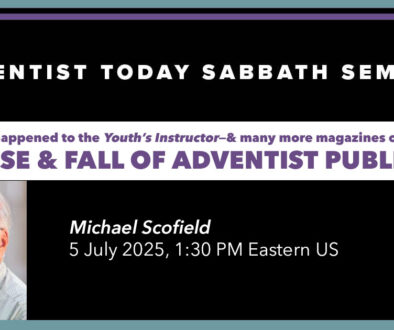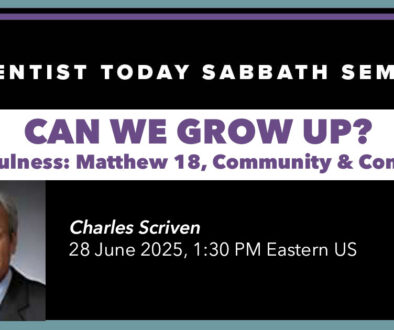Four new ATSS PRESENTS for you to enjoy
24 November 2022 |
The following ATSS PRESENTS programs are now on the Adventist Today YouTube channel.
Please subscribe to our YouTube channel.
Katrina Blue | 29 October 2022
Do you have family members, friends, neighbors, or co-workers who deny, or don’t know, or don’t seem to care, if God exists? How do you maintain and grow your own faith and spiritual life in a culture that actively promotes unbelief? Do you ever find it difficult to connect with God yourself? Jesus once said, “Blessed are those who have not seen and yet have believed” (John 20:29b).
With a growing number of atheists among younger generations it is important for Seventh-day Adventist Christians to understand the ideas, both historical and contemporary, that form the basis of atheism and agnosticism in the various cultures in which we live. Katrina Blue will present some of the key ideas that are put forward by atheists and agnostics as a backdrop to thinking about living and sharing your faith and spiritual life in the contemporary world.
Thandazani Mhlanga | 12 November 2022
I find the story of Uzzah in 1 Chronicles 13:1-11 and 2 Samuel 6:1-8 still as puzzling and perplexing as the first day I heard it. After all, if it weren’t for Uzzah, the ark might have fallen off the cart, which would have been embarrassing, not to mention disrespectful—and perhaps we would now be complaining about Uzzah’s carelessness in not saving the ark! Maybe this explains why I have never heard a homily on Uzzah.
How does one wrap one’s mind around a God of seemingly inexplicable contradictions? In the New Testament, He invites you to partner with Him in sharing the good news; yet in the Old Testament, if you give God a hand, He might take your life! How does the jury of religious public opinion resolve the case of Uzzah? What do the various interpretations say about God’s character? In this class, we’re going to study this troubling and mysterious story, to try to discover how Jewish and Christian commentators handled its theological ramifications.
Bryan Ness | 5 November 2022 When I started my biology education in 1980, I was confident that the creation story in the Bible could stand up to scientific scrutiny. As a third-generation Adventist educated in Adventist schools from first grade through high school, I had been taught that the earth was young (about 6,000 years old), and that geology, properly understood, supported this interpretation. I also had no doubt that the Adam of Genesis was the first man, created by God from the soil, and that all modern humans were descended from him. Evolutionists might claim that humans evolved from ancient primates and that our closest evolutionary relatives are chimpanzees and gorillas, but the fossil evidence was wholly inadequate to support their theories because there were so few “pre-human” fossils and paleoanthropologists couldn’t agree on precisely how humans had evolved.
As I began studying genetics in college, and later in graduate school, I believed that the newer insights from modern genetics would settle such questions as the origin of man in favor of a Biblical creation model using the principles of intelligent design. Sure, humans and chimpanzees might resemble each other in numerous ways, but this was only because the two species had a common designer, the God of the Bible, who used many of the same design elements to create each. As more and more genetic data accumulated, much of the newer data, rather than supporting an intelligent design approach, showed signs of evolution. Numerous lines of genetic evidence now support the contention that humans and chimpanzees share a common ancestor from which we evolved. With data from many individual human genomes, both modern and ancient, including genomic data from Neanderthals, Denisovans, and a variety of other pre-human remains, it has also become apparent that the extensive genetic diversity of modern humans could not have developed in a mere 6,000 years from a single human pair. In fact, according to some population geneticists, all modern humans today have been derived from a population of no fewer than 10,000 individuals sometime between 10,000 and 100,000 years ago. The reason for the broad time range is that through most of human history there were many more than 10,000 individuals, the smaller number representing a bottleneck in the human population. These many modern genetic discoveries clash directly with the traditional view that all of humanity are derived from a single human pair, Adam and Eve, approximately 6,000 years ago.
Since Adventists have traditionally believed that God speaks to us through both the Bible and the book of nature, what should we do when the evidence from these assumed compatible sources is so clearly at odds? Have we perhaps interpreted the book of Genesis incorrectly? Are there ways to recognize the scientific evidence and reinterpret the Biblical stories so that the two complement one another? In this seminar I will explore some potential solutions to this conundrum.
Carsten Thomsen | 22 October 2022 |
The following paragraphs are the background to the piece you’ll be reading and discussing this week, called “Ten Celebrations of Adventist Theology.”
I’m probably a lifelong rebel. Always exploring, examining from different angles. As an engineer, I love dreaming of crazy, innovative ideas that ultimately must meet the test of the real world. Some enjoying world-class success and others a devastating failure. Religion, although it deals with things we cannot measure, see, or feel, also must be tested in real life. “By their fruits shall ye know them”.
I was baptized too early. As an 11-year-old, I accepted it all—hook, line, and sinker. But at Andrews University, I learned to question, explore, and think. Since 1973 I’ve worked in “worldly” electronics firms until my recent retirement. I’ve been blessed by meeting many sincere, kind, creative, and ethical individuals. I’ve seen God bless his own creatures, regardless of creed.
But I’ve been troubled by the conflict between logic, faith, and glaring inconsistencies in the church. I’ve been frustrated by poor decision making, intolerance, religious arrogance, and hypocrisy…also in my own life… In recent years, that frustration boiled over when I watched the 2015 General Conference session and heard Ted Wilson’s words following the vote regarding women’s ordination. Words I perceived as trampling on the women of the church. I almost smashed my iPad.
At the 2021 Autumn Council I heard Ted Wilson’s Sabbath sermon, which struck me as negative, intolerant, and un-Christian. When I awoke at 3 a.m. that night, my anger had not subsided. Then I remembered: “Turn your negative energy into something positive”. I grabbed my Mac, sat up in bed, and wrote the “10 Celebrations of Adventist Theology”. I was tired of being negative, I was tired of being tired of…. That night I forced myself to look in my mental mirror and ask myself what I really believed. I had to be honest.
And it was cathartic. No longer an inherited or pass-me-down belief. Yet always a work in progress. I want to raise my view of Ellen White by following her advice and look up to the Bible. I want to raise my view of the Bible by looking up to Christ. It is not sola scripture, but sola Christ. I don’t worship the Bible, but the Lord of the Bible. I want to learn from Him who reveals himself through so many channels. I want a belief that is a big tent, but built on the rock. Not a house-of-cards religion that collapses if just one card falls.
So, I would like to share with you my journey through the Ten Celebrations of Adventist Theology in the Adventist Today Sabbath Seminar (ATSS) on October 22. Contribute your comments, critiques, and questions, and in our dialogue, I hope we can lift each other in growth and understanding.
To comment, click/tap here.




